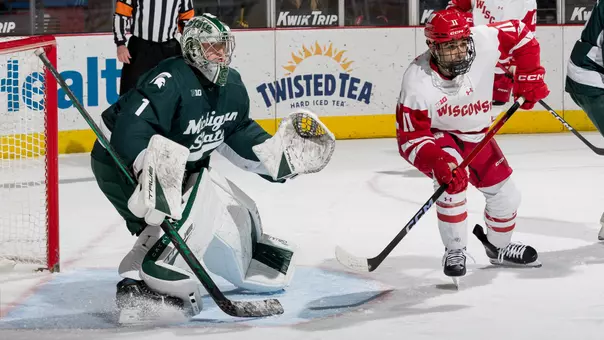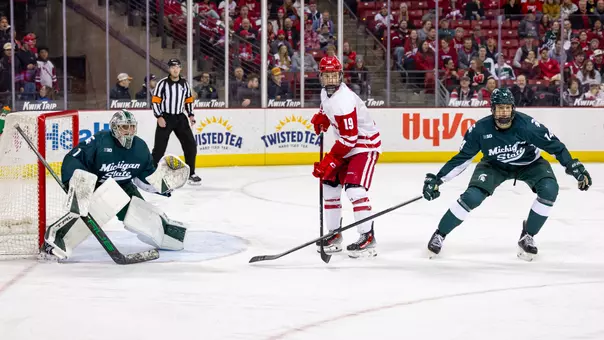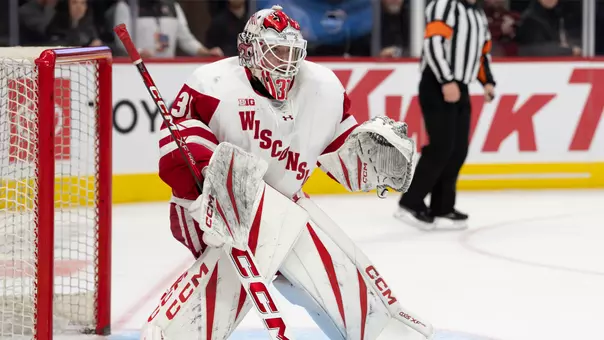Homegrown Heroes: Badgers' 2006 title deeply rooted in Wisconsin
January 27, 2016 | Men's Hockey, Andy Baggot
Jake Dowell has crammed a lot of living into the 10 years since UW claimed NCAA crown
More than half the roster called the state home, the schedule included a date at Lambeau Field and the path through the NCAA tournament didn't include a single border crossing, making the Badgers' sixth national title as deeply rooted in Wisconsin as any of the program's championships. Talent ran deep with that UW team, too, meaning few players will be in attendance when the 10th anniversary of their 2006 championship is marked this weekend -- 15 are still skating professionally. Jake Dowell understands both those dynamics as well as anyone and stands as an example of just how much can change in a decade. | From Varsity Magazine
 | ||
|
BY ANDY BAGGOT
UWBadgers.com Insider
The anniversary beckons, leaving Jake Dowell sounding incredulous.
"It doesn't really seem like it could be possible," he said.Ten seasons ago, the Wisconsin men's hockey team traveled a unique path to winning the sixth NCAA title in program history. Dowell was a junior wing/center on that club, an Eau Claire native whose state-centric roots were a major theme in that achievement.
More than half the 25-man roster hailed from Wisconsin and, thanks to good timing and fortune, the Badgers played all four national tournament games without having to leave the state. They won the NCAA Midwest Regional at the Resch Center in Green Bay, punctuated by a stirring victory over Cornell that required three overtimes. They followed that up with Frozen Four wins over Maine and Boston College at the Bradley Center in Milwaukee.
The 2-1 triumph over BC was a watershed moment for Wisconsin hockey. It came two weeks after the women's team knocked off Minnesota 3-0 at Mariucci Arena in Minneapolis to secure the first NCAA championship in that program's history. No other school before or since has claimed both Division I titles in the same season.
The 10th anniversary of that landmark double will be celebrated on multiple fronts this weekend. Members of those two teams will be honored Saturday night during a non-league series with Alaska at the Kohl Center. Members of that women's squad will be recognized Saturday afternoon during a Western Collegiate Hockey Association series with St. Cloud State at LaBahn Arena.
Asked to define the legacy of that men's team, Dowell was direct.
"It's still the closest team I've ever been on," he said. "Everybody for the most part has stayed in contact with everybody. It's a pretty special group."
The legacy goes much deeper than that, though.
Eleven members of that club went on to play in the NHL — including seven who skated in at least 100 games — and five are currently on active NHL rosters: goaltender Brian Elliott with St. Louis, defenseman Tom Gilbert with Montreal, winger Jack Skille and center Ben Street with Colorado and center Joe Pavelski with San Jose.
Two played for Stanley Cup champions (center Adam Burish with Chicago in 2010 and defenseman Davis Drewiske with Los Angeles in '12) and two more played in the NHL All-Star Game (Elliott with the Blues in 2012 and 2015 and Pavelski with the Sharks this year).
Dowell, Drewiske and defenseman Joe Piskula are playing for the American Hockey League affiliates of Chicago, Philadelphia and Anaheim, respectively.
Six of the '06 alums are currently playing professionally in Europe — Burish and winger Robbie Earl in Sweden and center Andrew Joudrey, defenseman Kyle Klubertanz, defenseman Jeff Likens and winger Ryan MacMurchy in Germany — which means there will be a very light turnout for the reunion.
"It sucks there won't be that many guys there, but it says something that so many guys are still playing," Dowell said.
"It's still the closest team I've ever been on," Dowell said. "Everybody for the most part has stayed in contact with everybody. It's a pretty special group."
Wisconsin coach Mike Eaves said the fact that 15 members of that club are still skating professionally and that 19 are still involved in hockey — either playing or coaching — is a testament to its quality.
"That's pretty neat," he said. "That speaks to the (talent) level of that team."
According to Dowell, a summertime reunion built around barbeques, fishing and golf is being planned during which the locals — Burish, Earl, Elliott, Gilbert, Joudrey and Pavelski are known to have homes in the Madison area — will serve as hosts.
"We'll get cozy," Dowell said wryly. "I think everyone can fit at Gilbert's house."
Dowell may be able to help because he and his wife, Carly, are looking to settle here as well. That's part of a plan that includes him securing the final six credits he needs for a degree in sociology. He would be the 15th member of that team to graduate from Wisconsin. Four others — Drewiske, Earl, Piskula and Skille — are actively pursuing degrees as well.
A lot of living can be crammed into 10 years, and no one knows that better than Dowell. He's seen death in its cruelest form, felt the crushing weight of life-threatening dread and teetered on the edge of an emotional abyss. He's also brought new life into the world, had his greatest fear dissolve into ecstasy and explored the boundaries of rebirth.
Dowell spent a good chunk of his 30 years wondering how he would die. He was 16 when his father, John, was found to have Huntington's disease, a fatal genetic disorder that kills brain cells and erodes motor skills. There is no cure. His only brother, Luke, also was diagnosed with HD. There was a 50-50 chance Jake had the gene as well.
John Dowell died Feb. 13, 2014 at the age of 58. Luke, 31, needs 24-hour care for his HD and bipolar schizophrenia.
The specter of HD followed Jake from the U.S. National Team Developmental Program in Ann Arbor, Michigan, to Madison and to eight different pro stops in five states and two countries. He kept putting off getting the necessary blood test in part because a positive test might affect his employment status.
"Whether I ever consciously knew I was thinking about it, it was always in the back of my mind and I knew I would have to face the music with it," he said.
During a doctor's appointment in November, Dowell, on a whim, asked that blood be drawn and forwarded to Mayo Clinic in Rochester, Minnesota, for testing.
"I was really struggling with it for a little while at the end of the summer and the start of the season," he said of the decision. "There was a lot going on."
Dowell, who's played in 157 career NHL games with Chicago, Dallas and Minnesota, was out of work until he tried out for the Blackhawks' AHL affiliate in Rockford.
Luke wasn't doing well, either, and that was compounded by the fact his care facility was closing.
There also was the matter of fatherhood. Jake and Carly became parents in July when Elizabeth Claire was born.
"It all made me come back to thinking about (the test) and whether or not I was sick," Dowell said. "I said, 'I've got to get that done.'"
Three weeks passed before Dowell got a text message from his physician late on a Saturday afternoon.
"I'm leaving work in five minutes," it said. "Call me."
Dowell stepped out of the house and called knowing he had a game that night. The best possible news was delivered.
Carly didn't know her husband had gotten the text or made the call. Her reaction?

"Just shock," Jake said.
Perhaps the best call was made to Dowell's mother, Vicki, who tended to her husband and oldest son and watched them deteriorate.
"I had to get off the phone with her because she was screaming so loud I couldn't take it," Jake said. "I couldn't understand a thing she said, but it was awesome."
Can a 30-year-old man be reborn? In this case, yes.
"I know it's such a cliché to say it, but it feels like a weight's been lifted off my shoulders," he said. "It's so much lighter because I'm not thinking about it."
ESPN did an E:60 episode on Dowell's plight two years ago. They came back to film the joyous conclusion last week. Not only is Dowell the captain of the Icehogs, he was chosen to play in the AHL All-Star Game.
"To finally know that I can just be normal is amazing," he said.
Dowell said he long wanted a family, but it never crossed his mind that he'd ever have a daughter. A prenatal test comparing DNA samples determined little Ellie wasn't a carrier of the HD gene.
"I always thought about playing hockey, baseball and football with a little boy," he said.
Elizabeth Claire now owns his heart.
"Whatever it is, I get to be around for it now," Dowell said. "It's great."
As for his brother, Dowell said a woman who grew close to Luke during his stay at the care facility took him into her home and now oversees his round-the-clock care.
"It's one of those things that unless you live it, you don't have a clue what some of those people go through," Jake said.
The positive diagnosis made it easier for Dowell to reminisce about that fabled team from a decade ago, one that finished 30-10-3 overall and remains the signature achievement of the Eaves Era. To this day, most everyone is an enthusiastic participant on an email exchange.
"Just a good group of guys," Dowell said, noting that Drewiske is the godfather to his child. "There's so many little inside jokes that come out in all these emails, mocking everybody. It's all in good fun and everything. They're things you may have forgotten about and it's so funny."
Like the trophy. The original developed some — ahem — blemishes during the title-winning celebration that lasted into the wee morning hours and beyond. A replacement had to be purchased, which Pavelski invoked during a recent flurry of emails.
"I'm pretty sure we own that trophy now," he wrote. "We had to pay for it."
Thirteen members of the team were from Wisconsin, which is why their favorite memory might not be that come-from-behind win over BC before a partisan sellout crowd of 17,758 at the Bradley Center.
"It's easy to say the national championship game," Dowell said, "but the Lambeau Field game was one of the coolest experiences."
The Badgers defeated Ohio State 4-2 in the inaugural Frozen Tundra Classic at the iconic NFL facility. Dowell didn't know it at the time, but his future in-laws, both Ohio State graduates, were in the stands that early February day. His future wife, meanwhile, was a Wisconsin freshman cheering for the Badgers.
"Small world," Dowell said.
"I know it's such a cliché to say it, but it feels like a weight's been lifted off my shoulders," Dowell said of his Huntington's disease test results. "It's so much lighter because I'm not thinking about it."
Led by the Wisconsin natives, the victory was memorably celebrated with a collective Lambeau Leap. Oddly, Dowell has played at Lambeau Field, but never been there as a spectator to see the Packers play there.
"Makes it even cooler," he said.
The men's and women's teams were close long before they picked up matching NCAA championship trophies in 2006. The two-time captain of the men's team was Adam Burish, a senior winger. An assistant captain for the women's team was his sister, Nikki Burish, a senior center. Both grew up in Madison and shared gregarious personalities.
"With Adam and Nikki being so close, they spent a lot of time together, so whenever Nikki would have some of the girls from that team around when we were all getting together," Dowell recalled.
Upon returning from Minneapolis, the newly crowned women's titlists scrawled good-natured challenges on a huge white board in a shared meeting room. When the bookends were secure, both teams shared the stage at a pep rally at the Kohl Center.
"It was really fun to be able to celebrate at the same time," Dowell said. "It was pretty cool."
Dowell was asked if there's a prevailing lesson from that team that rings true today.
"From that team specifically it was the importance of people buying into their role for the better of the team," he said. "Sometimes that's a tough pill to swallow, but you do your thing and we end up winning."
Dowell specifically cited the fourth line of center Andy Brandt and wingers A.J. Degenhardt and Nick Licari for their unselfishness.
"It's hard to even imagine that that's how deep our team was," Dowell said.
Memories of that season — how Elliott came back from a knee injury to fortify a stirring playoff run; how Pavelski emerged as a world-class talent; how the team regrouped after a 3-7-1 stretch in January and February — remain vivid 10 years later.
Eaves said a brutal February weekend at Minnesota State — 6-4 and 7-3 losses that gave way to a prolonged team meeting — proved to be a vital emotional kick-start.
"Something that appeared to be a real negative turned out to be the final piece of that team come together," Eaves said. "That's what resonates about that team."
Its signature feature remains strong a decade later.
"It was a team that really knew how to have a heck of a time," Dowell said, "but also really knew how to put the work in when we had to."













